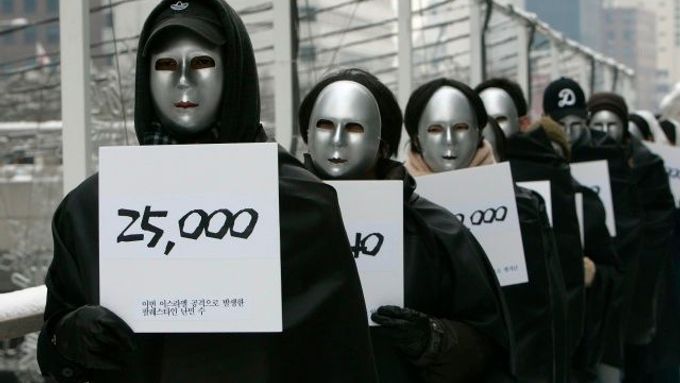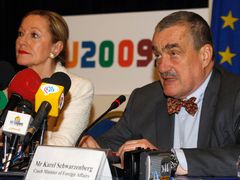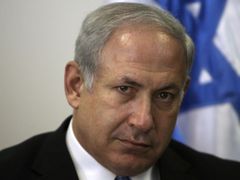
More at Prague Wanderer
Prague - On the first day of its six-month European Union Presidency, the Czech Republic was immediately faced with what Czech media outlets dubbed as 'the two Gs' - the Russian gas crisis and Gaza - where Israel and Hamas were at war.
Some European leaders worried that the Czechs would have trouble dealing with its former overlord, but Czech Prime Minister Mirek Topolánek received kudos from many of the EU's 27 member states for his negotiations with Ukraine and Russia, whose standoff briefly threatened to turn off the heat in several Eastern European countries in the heart of winter.
Instead, it was the Middle East conflict that revealed friction between the Czech Republic, historically a supporter of Israel, and several of the EU's most powerful Western European countries who have long been harsh in their condemnation of Israel's use of force.
"The Czech Republic is known for its affinities towards Israel," said Jan Hamáček, chairman of the Foreign Affairs Committee of the Czech Parliament's Chamber of Deputies. "In order to present a unified presidency position, it requires our diplomats to take a different stand than they would have if it had only been the Czech position."
The Czech Republic is in the midst of a tightrope act, trying to maintain its own foreign policy priorities while also representing the often clashing views of European leaders towards the Middle East—not an easy task for the first former Eastern Bloc country to lead the EU. The Czech Republic was dubbed recently by the Associated Press a mere diplomatic "minnow" in comparison to the international big players like France and Germany.
However, recent developments have shown that Czechs can pull off the balancing act.
Showing strong position
On February 20, the Czech EU Presidency condemned continued Israeli settlements in the occupied territories, showing a strong, clear position consistent with the U.S. and European Union position that Israel's expansion threatens the creation of a viable Palestinian state.
In January, Czech Foreign Minister Karel Schwarzenberg signed an EU letter to Israel criticizing its blockage of humanitarian aid to Gaza.
As a measure of its commitment to the Palestinians, the Czech Republic has earmarked 15 million crowns for humanitarian aid to the Gaza Strip, which is a substantial amount given the economic crisis that has now engulfed Europe.
However, these actions come in the wake of the country's sometimes troubled efforts to avoid being labeled as one of the most pro-Israel countries in Europe.
Even Schwarzenberg has suggested he sees nothing wrong with showing unabashed affection for the only democracy in the Middle East. "It's perfectly true. I don't deny it. I am a lifelong friend of Israel," he told the Jewish Telegraphic Agency in the midst of Israel's ground invasion of Gaza.
The diplomatic gaffe
The initial flubbed Czech reaction to Israel's ground invasion, aimed at ending Hamas's firing of rockets into Israeli territory, was not an auspicious diplomatic start to the European Presidency.
A presidency spokesperson described the Israeli land incursion as a "defensive, not offensive" reaction on January 2. British and French diplomats immediately condemned the statement, as it signaled approval for the use of force, something the EU seeks to prevent.
Hours later, Schwarzenberg announced the spokesman had made a serious mistake due to "youthful inexperience," and he called on Israel to end its operation, which was racking up a Palestinian civilian death toll, and for Hamas to stop firing rockets.
Some believe, however, that the statement provided insight into the real view of the country's leaders on the Palestinian-Israeli conflict.
"It was a mistake, but I don't think it is appropriate to blame it on the spokesperson," said Hamáček, a member of the Social Democratic opposition to the center-right government. "He recalled what some of the leading politicians said, perhaps not on the record. But, I am convinced that is what the Prime Minister thought."
Image of disunity
This diplomatic faux pas created the image of disunity in the EU, already a problem as French President Nicolas Sarkozy had recently engaged in peace negotiations across the Middle East even as an EU delegation led by Schwarzenberg was in the region.
It is a matter of debate whether the now infamous Czech gaffe weakened the country's standing in the Arab world.
According to Lamis Khalilová, head of the Centre for Middle Eastern Studies at the Metropolitan University in Prague, the spokesman's statement may have strained Czech-Arab relations.
"The Czech image in the Arab world was tarnished by that so-called mistake," said Khalilová, who is herself both Czech and Palestinian.
Khalilová recalls that even after the statement was corrected by Schwarzenberg, the Arab media continued to report it.
"They were very surprised, and they just kept quoting it," said Khalilova.
This was not the first time a Czech statement on the Middle East has generated controversy.
In 2002, former Czech Prime Minister Miloš Zeman compared Yasser Arafat, the Palestinian leader at the time, to Adolf Hitler.
The Czech-Israeli relationship—then and now
The Czech relationship with the state of Israel is also unique within Central and Eastern Europe.
"A special relationship would be an exaggeration, but there are deep roots," stated Tomáš Němeček, a New York University in Prague professor specializing in modern Czech politics.
During Israel's war for independence in 1948, Czechoslovakia was the only country to break a United Nations arms embargo and provide pilots, weapons, and airplanes to the Israeli army. The Communist Czechoslovak government hoped in vain that Israel would come under the Soviet sphere of influence.
Then came the 1967 Six-Day war, which saw Israel gain territory from its Arab neighbors.
Czechoslovakia joined the Soviet Bloc in its boycott of Israel and promoted anti-Zionist and sometimes anti-Semitic rhetoric. The Communist country brokered numerous weapons deals with Arab states and engaged in deep cultural, educational, and diplomatic exchanges with Israel's enemies until the Velvet Revolution of 1989.
Because of this complicated history, the idea of a completely one-sided Czech position is misguided, and Schwarzenberg is an experienced politician able to strike the right balance with the EU, argued Jiří Schneider, Program Director of the Prague Security Studies Institute and former Czech Ambassador to Israel.
The Czech EU Presidency's strong statement condemning Israeli plans for settlement expansion into the West Bank occurred just days before Palestinian President Mahmoud Abbas met with his counterpart Václav Klaus in Prague to discuss the prospects for Palestinian unity and peace negotiations.
"Settlement activity undermines all the efforts of Arab partners committed to a peaceful resolution of the conflict and calls into question the seriousness of Israel's commitment to the two-state solution," the EU statement said.
In contrast to the United States, which has long defended what it deems Israel's right to defend itself with force, the EU is far less accepting of military solutions and is more focused on providing humanitarian aid to the Palestinians.
The many faces of Europe in the Middle East
Within the EU there are vast differences in policy statements towards Israel, with Socialist-led governments typically offering the harshest critiques of Israeli military operations.
Since 1967, France has traditionally emphasized what is known as la politique arabe - maintaining close ties with Arab countries such as Syria and Lebanon and being a vocal critic of Israel. (That policy, however, is in question, as the center-right Sarkozy has a more positive relationship with Israel than his Socialist predecessors).
In Spain, a pro-Gaza march in January of more than 100,000 included representatives of Socialist Prime Minister Jose Luis Rodriguez Zapatero.
In contrast, newer member states that once chafed under the Soviet Union have strong Atlanticist ties and a tendency to sympathize with the Israeli viewpoint that sometimes tanks are more effective than words. Germany is also one of Israel's closest European allies.
The future of the EU's role in Israeli-Palestinian peace efforts is in following Israel's move to the right and stalled negotiations between Hamas and Abbas's Fatah party.
The Czech EU Presidency voiced its worries about the nomination of hardliner Benjamin Netanyahu as the next Israeli Prime Minister following the February parliamentary elections.
"I think we could have a rough start but we need to move ahead with the peace process because the two-state solution road is narrowing and we can't afford the luxury of waiting," said Czech Deputy Prime Minister Alexandr Vondra.
Some believe that the Czech voice has an important role to play in helping to bring Israel to the negotiating table.
For instance, the Israelis know that when they get criticism from the Czech Republic, it is coming from a friend.
"We should use the fact that we are not looked at with suspicion and Israel seems to trust the Czech Republic," said Hamáček.
Earlier this year, Schwarzenberg, on a visit to Israel, asked officials to allow humanitarian aid to reach beleaguered Gaza residents during the war. According to Anat Gilead, Councilor for the Czech Presidency in the Israeli Embassy in Prague, Israel immediately acquiesced to Schwarzenberg's plea.
"When there's only pressure and not understanding, that creates a lack of trust," said Gilead.
This story was originally published by the Prague Wanderer, a web-zine run by New York University students in Prague, Czech Republic.
Sairah Zaidi is a fourth-year student at Cleveland State University studying political science and international relations. She is from Cleveland, Ohio.
Deena Sami is a second-year student at New York University studying journalism and Middle Eastern and Islamic studies. She is from Orange County, California.










